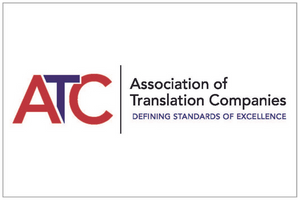HOME | CASE STUDIES | HOW TO USE THE WHEEL | PRICING | SUPPORT
Case Study: Association of Translation Companies
Mission and strategic aims
The ATC’s mission is to act as the UK authority for language service companies. It defines standards of excellence for language service companies by promoting quality-driven language services and best practice in line with its strategic aims of support, influence, engagement, and governance.
Better engagement, with the same resources
Over the past five years, the ATC has focused on defining and implementing strategies to respond to its member companies’ diverging needs and interests. The association’s initiatives and activities span from public sector procurement practices to business guidance, and from networking events to industry research.
This focused, targeted drive has boosted the association’s profile both within its membership, and with its wider language services industry and external stakeholders. Since the implementation of a strategic approach to the association’s growth, it has grown its membership numbers by 45%, a huge achievement in the midst of a Brexit and the global Covid pandemic, which deeply affected the business of many of its member companies.
Despite its growing membership numbers, and very low member attrition rates, the ATC has struggled with active engagement with a majority of its members. Beyond a minority of actively engaged members, membership survey data in the past has been collected via SurveyMonkey or Google Forms and response rates have been very low. This is a huge handicap for the association, as it cannot easily recognise which activities and initiatives have the most impact, and are the most meaningful. Within a small association with very limited financial and human resources, this is a significant challenge.
The ATC’s leadership recognises that, to continue to remain relevant for members’ changing needs, and to continue to drive the association forward, it needs to
- achieve higher member engagement levels, and create a wider sense of commitment and community spirit amongst its membership;
- understand how the membership sees the association’s current activities and initiatives; and
- gain deeper insights to develop the association’s future strategies.
For the ATC, it’s critical to put its limited human resources to the best use, in the service and for the benefit of its member companies, and the wider language services industry.
Sparking strategic conversations
As one of the first associations implementing the Community Impact Wheel globally, the ATC has been in a unique position to trial its use in different scenarios.
Recognising the need to review the association’s strategy, the ATC’s Council in 2023 embarked on a review of its mission, values and strategic aims, following a time of extreme disruption and major change to its member companies with Brexit and the Covid pandemic, and an emerging new industry landscape in the form of AI-enabled technology.
In this, the Community Impact Wheel proved a valuable tool in providing a balanced point of departure for discussion within the ATC’s Council. The Community Impact Wheel was instrumental in giving voice and making visible the views and values of all of the Council’s members in an online workshop environment – a tough medium to do meaningful strategic work at the best of times.
Sparking important conversations on the use of the association’s resources, the results revealed a discrepancy in the Council’s expectations around different activities and initiatives, and the current use of its resources. This was most prominent in events organisation, and in the realisation that having a full-blown three day conference, going forward, needed to be a strategic decision rather than a nice-to-have.
Following the Council’s strategic discussions, facilitated by the Community Impact Wheel, the allocation of the associations internal human and financial resources has acquired a much more strategic approach. All activities are balanced against the strategic focus areas, and decisions – the easy ones as well as the tough ones – are being made with more clarity and certainty than ever before, for the benefit of the association’s member community.

